Breaking

Armenian Prime Nikol Pashinyan paid a working visit to the United States of America from February 3-7, 2025.
As part of the visit:
- February 3, 2025 – The Prime Minister meets with representatives of the Armenian community in the U.S., discussing key issues concerning the diaspora and Armenia.
- February 4, 2025 – Meets with the Chairman of the Commission between the World Council of Churches and the Vatican, as well as leaders of Armenian organizations in the U.S.
- February 4, 2025 – Attends a reception organized by “Save Armenia.”
- February 4, 2025 – Meets with Senate Armed Services Committee Chair Roger Wicker and Congressmen Andy Harris, Frank Pallone, and Richard Hudson to discuss U.S.-Armenia relations and regional security.
- February 5, 2025 – Visits the Atlantic Council and delivers a speech. Prime Minister Pashinyan expressed hope that the new U.S. administration under President Donald Trump will support Armenia’s efforts to resolve the conflict with Azerbaijan.
- February 5, 2025 – Participates in the International Religious Freedom Summit, delivers a speech. “Religious freedom is a fundamental part of democracy in Armenia. In terms of regional relations, three of our four neighboring countries—Iran, Turkey, and Azerbaijan—have predominantly Muslim populations, while Georgia has a large Muslim community. This highlights the importance of religious tolerance for regional stability,” he stated.
- February 6, 2025 – Delivered a lecture at Georgetown University, focusing on Armenia’s democratic progress, regional security, and U.S.-Armenia relations.
- February 6, 2025 – Meets with the President of the International Republican Institute (IRI) to discuss Armenia’s democratic progress and cooperation.
- February 6, 2025 – Participates in the National Prayer Breakfast.
CFTJ Joins IRF Summit in Washington, D.C. to Present Evidence on Azerbaijan’s Persecution of Christian Armenians
Staff attorneys and board members from The Center for Truth and Justice (CFTJ) have traveled from Armenia and Los Angeles to Washington, D.C. for the International Religious Freedom (IRF) Summit on February 4-5, 2025.
On February 3, 2025, Anahit Harutyunyan, CFTJ’s Armenia Operations Coordinator, delivered a compelling speech at the IRF Roundtable, emphasizing Armenian identity, its deep cultural and religious roots, and Azerbaijan’s weaponization of this identity to justify persecution. She presented harrowing testimonies of religious oppression and evidence of Azerbaijan’s systematic destruction of Armenian churches, cemeteries, and cultural sites.

On February 4, Sharmagh Mardi, CFTJ’s Armenia Supervising Lawyer, delivered the opening remarks at the IRF Panel “Voices Behind the Bars”, highlighting the systematic abuse and torture endured by Armenian POWs and hostages due to their ethnic and religious identity as Christian Armenians. She presented testimonies collected by CFTJ, providing compelling evidence that these atrocities are rooted in ethnic and religious persecution.
Beyond the summit, CFTJ will meet with members of Congress, senators, and members of the Trump administration to advocate for action against religious persecution and cultural destruction.
In partnership with Save the Persecuted Christians, Save Armenia, and Mercy One & Nazarene Fund, CFTJ will highlight Azerbaijan’s persecution of Christian Armenians, ensuring these violations are recognized and addressed.
Congressional Armenian Caucus Leaders Urge Sec. of State Rubio to Strengthen U.S.-Armenia Ties
The letter urges:
- Robust implementation of the U.S.-Armenia Strategic Partnership, ensuring the continued strengthening of bilateral ties, economic cooperation, and democratic reforms.
- Strengthening U.S.-Armenia defense cooperation, including enhanced security collaboration, support for border security, and the provision of purely defensive equipment such as anti-aircraft and anti-drone systems to safeguard Armenia’s territorial integrity.
- Demands the enforcement of sanctions on Azerbaijan, including full implementation of Section 907 of the FREEDOM Support Act, the application of Global Magnitsky sanctions, and the denial of EXIM Bank financing for dual-use sales to Azerbaijan.
- Insists on ending Turkey and Azerbaijan’s blockade of Armenia, securing Armenia’s territorial integrity, economic resilience, and regional stability.
- Advocates for a dignified and durable peace between Armenia and Azerbaijan, ensuring the release of all Armenian hostages illegally detained in Baku, the safe return of displaced Armenians to Nagorno-Karabakh, and international protections for Armenian cultural heritage.


PACE Commends Armenia’s Ongoing Commitment to Democratic Development
Commends Armenia for its continued commitment to democratic development despite security challenges.
Refers to its Resolution 2517 (2023) and Recommendation 2260 (2023) where it “regrets that more than 100 600 persons – had left its ancestral homeland and fled to Armenia, and called on Azerbaijan to release all detained representatives of Nagorno- Karabakh and all Armenian prisoners of war currently held in Azerbaijan.”
- Acknowledges Armenia’s democratic progress in holding free and fair elections.
- Welcomes Armenia’s ratification of the Rome Statute and Protocol No. 13 on abolishing the death penalty.
Azerbaijan’s Ethnic Cleansing in Nagorno-Karabakh and Genocidal Policy
New CFTJ Report Exposes Azerbaijan’s Systematic Erasure of Armenian Cultural and Religious Heritage in 2024
Azerbaijan’s acts of vandalism, destruction, and conversion are part of a broader, long-standing campaign to erase the historical and cultural ties of the ethnic Armenians to their indigenous lands in the South Caucasus. Beyond the destruction of historical landmarks, Azerbaijan’s actions constitute an attack on faith itself. The deliberate desecration, destruction, and forced repurposing of these sacred sites are not only violations of cultural rights but also an assault on religious freedom, depriving displaced Armenians of their ability to practice their faith in their ancestral homeland. Through analysis of documented incidents and legal framework, this report aims to highlight the ongoing cultural erasure in the wake of the conflict and the urgent need for global efforts to protect cultural and religious heritage.
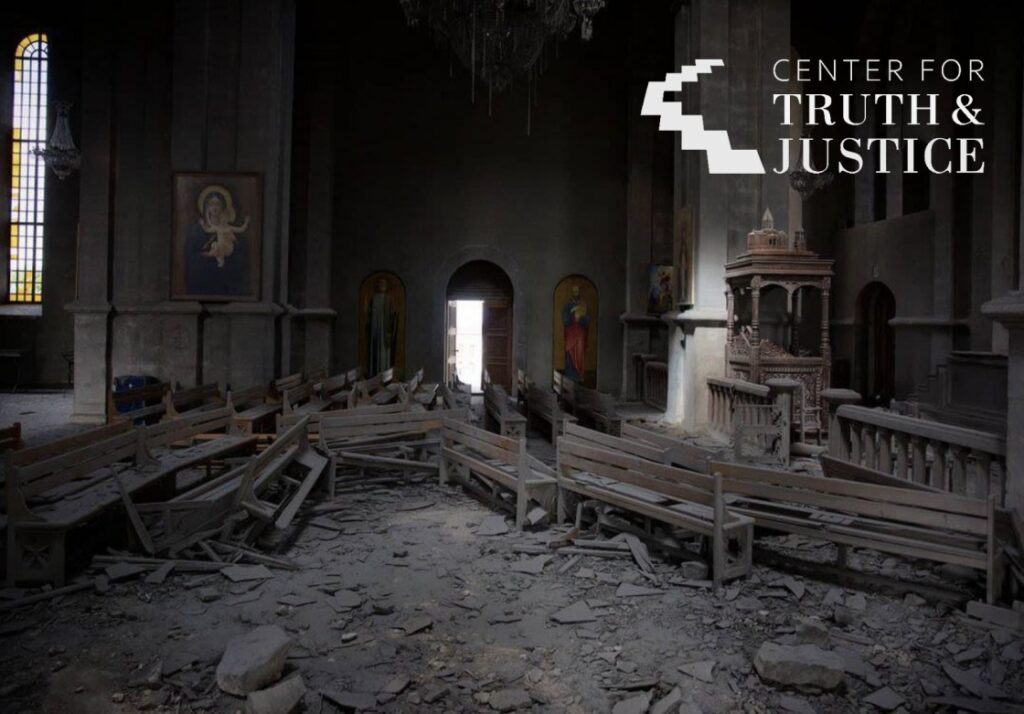
Photos of the Week
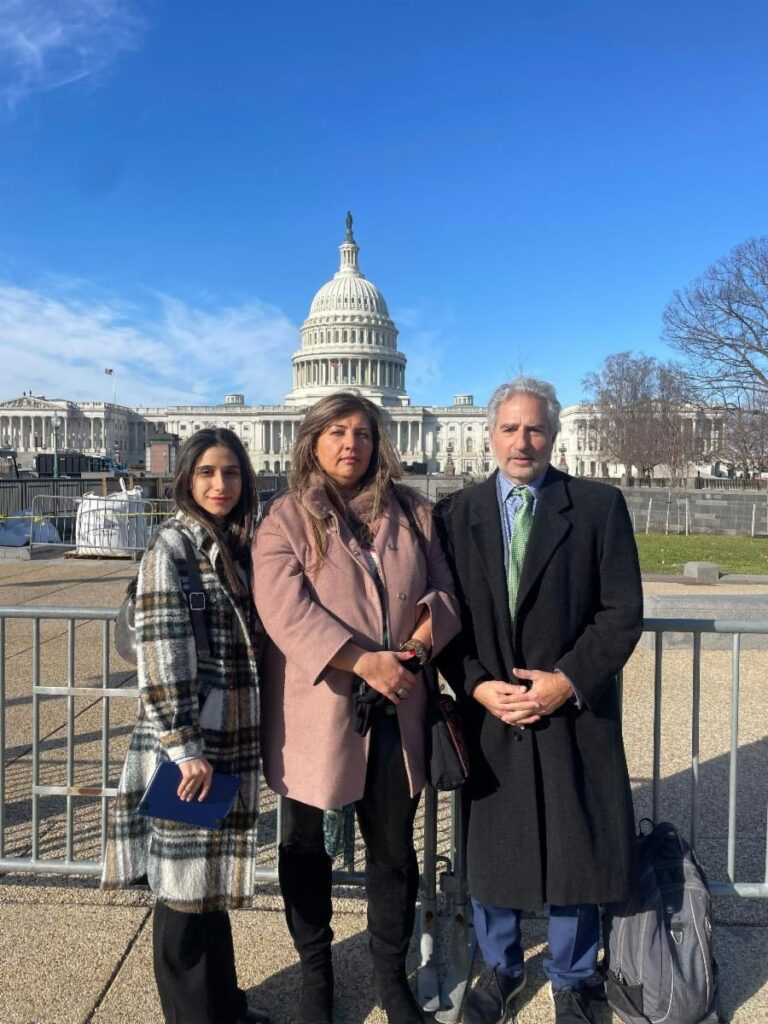
Global ARM President Tim Jemal and the CFTJ team at Capitol Hill, Washington, D.C. in between meetings with members of Congress and staff – February 7, 2025.
Photo Courtesy of Global ARM.
Driven by Fear from Nagorno-Karabakh
Tears and Tragedy: Former Nagorno-Karabakh Resident Reflects on the Desecration of Ghazanchetsots Church
“The Republic of Azerbaijan targeted and partially destroyed our white beauty — the Ghazanchetsots Church, and continues to destroy it by converting it into a mosque. It does not matter what religion one practices, there should be respect towards every religion, even if it is your enemy’s, and targeting any religious place is simply sacrilege… I would visit Ghazanchetsots so often. [The witness continues with tears] It was so beautiful, it looked like a white bride. Whenever I entered that church, I felt so calm. Ghazanchetsots was a very special place for us, Artsakhtsis [Nagorno-Karabakh residents]. Even though there are countless churches and monasteries in Artsakh, many would imagine their wedding, or baptism in Ghazanchetsots. It felt like you left the church of Ghazanchetsots purified,” states a former Nagorno-Karabakh Resident.
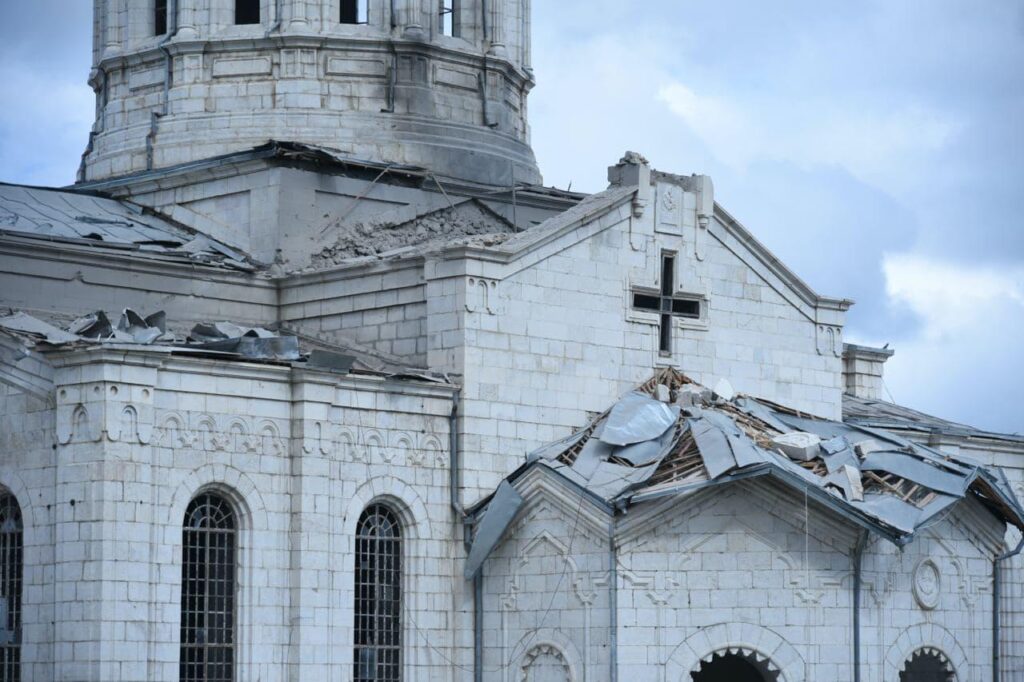
Armenia Participates in Combined Resolve Military Exercises with U.S.


Prosecutor-General, U.S. Ambassador Discuss Issues of Mutual Interest
During the meeting Prosecutor-General Vardapetyan attached importance to the existing partnership between the general prosecution and the U.S. embassy based on mutual trust, as well as the continuity of joint work in priority directions.
EU Extends Mandate of EU Civilian Mission for Two Years

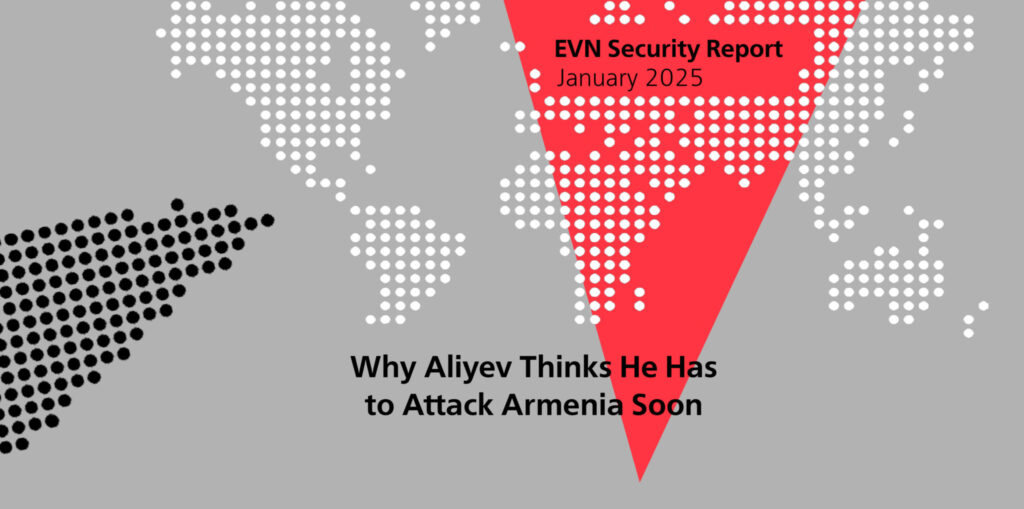
Why Aliyev Thinks He Has to Attack Armenia Soon
By Nerses Kopalyan
While Armenia has continued to enhance the diplomatization of its security, such as recently signing a Strategic Partnership with the United States and agreeing with the European Union to extend the EU Observation Mission for another two years, this, in of itself, will not suffice to deter Aliyev from attacking if he qualifies the threat to the balance of power configuration as severe. In essence, while Armenia has added additional layers of soft deterrence to its security architecture, Aliyev will be willing to attack and risk losing immense international diplomatic capital if he deems it necessary to preserve the power disparity.

Deputy Prime Minister, U.S. Ambassodor Discuss Armenian-American Bilateral Relations
Opinion
Trump Vowed to Protect Armenian Christian. He Can Start Here
By David Ignatius
Armenian Ruben Vardanyan is on trial in Azerbaijan. His crime? Helping others.
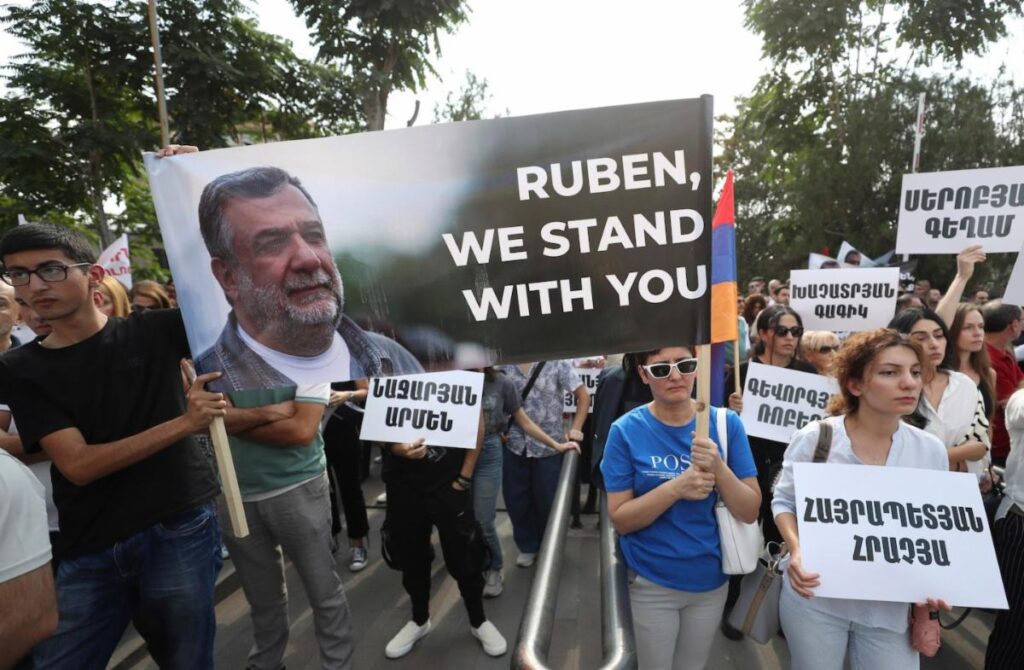
Israel Should Leave Jerusalem’s Armenian Quarter to the Armenians
By Michael Rubin
Across the Middle East, Christians are under threat. Only in Israel does the community thrive. As the Islamic Republic of Iran represses minorities directly and by proxy, as Turkey alongside Azerbaijan promotes renewed genocide against Armenians, as Turkey-backed Islamists in Syria threaten the Armenian community of Aleppo, and as other Arab states like Egypt museumify religious minorities, Israel should stand firm in solidarity with Christians under fire.

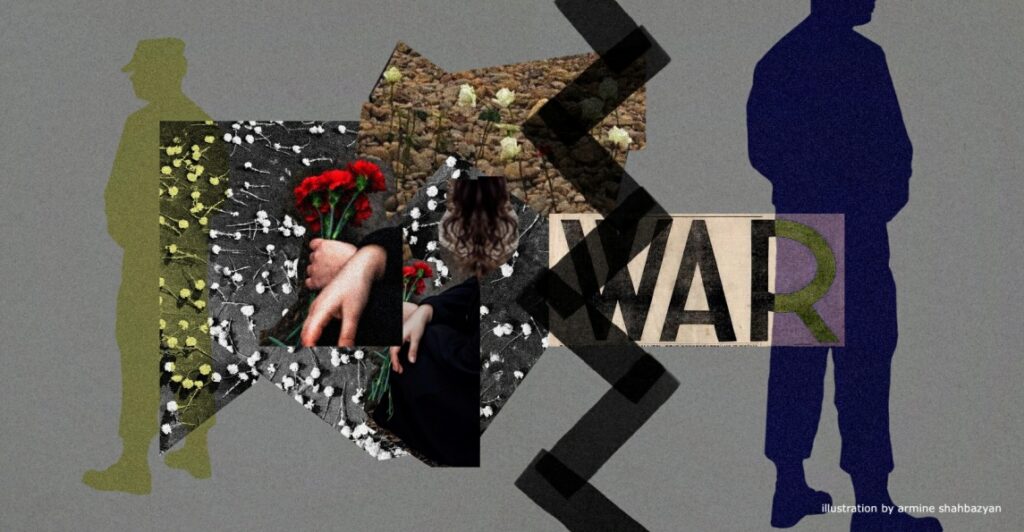
Searching for “Western Azerbaijan”
By Rasmus Canbäck
Since the incorporation of “Western Azerbaijan” in official state policy in Azerbaijan, a degree of historical revisionism has also resurged. Without delving into historical debates about population figures, the facts presented by Azerbaijan are not always consistent. Their own estimates vary dramatically—by as much as 100,000 people (from 200,000 to 300,000), making them hardly reliable.
Aliyev’s Campaign: Aiming to Deter International Support for Armenia
By Sossi Tatikyan
Blaming U.S.–EU Cooperation With Armenia for its “Partiality”
Aliyev called the cooperation framework signed by Washington, Brussels and Yerevan in April 2024 in Brussels, “an unprecedented and troubling development.” He stated that while the agreement’s military component was officially removed, “de facto, it remains there.”
Aliyev cited the EU and United States’ alleged “partiality” toward Armenia as the reason for rejecting EU mediation in the Azerbaijan-Armenia normalization process and declining U.S. Secretary of State Antony Blinken’s invitation for a trilateral meeting in December 2024. He insisted that Azerbaijan favors a bilateral negotiation format and accused the West of pursuing policies that undermine Azerbaijan’s sovereignty.

